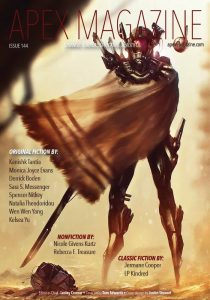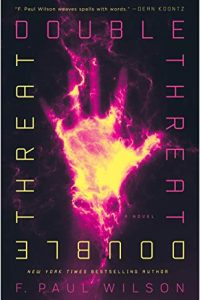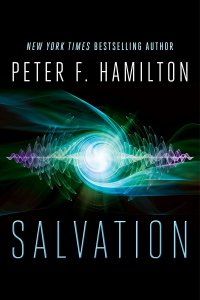Paula Guran Reviews Apex, The Sunday Morning Transport and Reactor
 Apex #144
Apex #144
The Sunday Morning Transport 4/7/24, 4/21/24, 4/28/24, 5/5/24, 5/19/24
Reactor 1/1/24 – 5/22/24
Apex #144 features five original stories. “Those Left Behind” by Kanishk Tantia is a deftly written SF story about two robotic caregivers crafted to look and act exactly like dead human spouses. When their elderly humans permanently leave Earth (along with every other human on the planet) the robots realize that that those they cared for did not care for them. A journey of self-discovery commences. It’s touching and insightful, but I was left pondering matters I doubt the author intended me to consider. This future cannot solve Earth’s ecological crises, but evidently provides an extremely high level of technological comfort customed tailored to every single inhabitant. All of whom are then transported into space. Hmm.
Ekaterina, in Monica Joyce Evans’s “At Night She Dreams of Silverfish”, is a scientist who wanted to get away from it all and did so by accepting a position on an ocean-covered world no one else wants to work on. Now she’s desperately lonely with no way to escape her situation. The story takes a horrific turn – or maybe it’s all in Ekaterina’s head. Interesting, but the scare comes before the dread has had time to build.
Derrick Boden’s epistolary “Down the Dust Hatch” is set in a mining base on an asteroid that can no longer manufacture breathable air. While awaiting resupply, the Syndicate running the show has a cost-effective solution: Prove your productivity or lose your air. Profitability rules, but the clever (nameless) narrator has an angle. Scammers, of course, inevitably get scammed. The swindler has good reason to stay alive. But, since everyone is justifiably desperate to survive, can the reader sympathize enough to care about the story?
Considering desperate nameless narrators, we meet another in the cyberpunkish “The Clown Watches the Clown” by Sara S. Messenger. This one dresses up as a clown and lets people beat them up in the alley behind a shady cybermotel on the spaceport where they live. There’s more than need-based masochism going on here. Striking port workers wear clown getups and, to protest, clown instead of work. The narrator supports them but dares not strike. Messenger packs a lot – addiction, racism/speciesism, social/political action, repression/oppression, damaged and damaging relationships – into 4900 words. Vivid, depressing, illuminating.
In the charming “The Jukebox Man” by Natalia Theodoridou, a woman meets a man in a bar. He is a living jukebox: records spinning in his chest, music playing through his open mouth. As the relationship continues, she realizes how “regular, almost rhythmical, everything about her is, timed down to the minute.” He is the Jukebox Man; she is Metronome Woman. But love, and music, is not enough.
The issue also contains three flash pieces. Spencer Nitkey’s “The Art the Owls Can’t Swallow” deals with an artist obsessed with owl pellets whose marriage has deteriorated to scat itself. Nitkey uses the character’s art to creditably tell a nicely dark take. Wen Wen Yang tackles colonialism and a dehumanizing relationship reminiscent of “Madame Butterfly” in the brief but poignant “Out of Print”. In the lovely “To Rise Again” by Kelsea Yu the sky, or at least the sunset, literally falls.
All the stories published weekly this spring by The Sunday Morning Transport are worthwhile reading. I’m skipping over a few, but these are the ones I recommend. A popular novelist, in the haunting and somewhat mysterious “The Last Book of Christine Vale” (May 19) by Kat Howard, is pestered by rabid fans and media blather about how much of her fiction reflects her real life. She begins to feel that if she were to disappear and leave only her words, “then all that was left would be true.” She vanishes after a house fire. But what words are left?
Jeffrey Ford has been writing impressive and usually weird fiction for more than forty years. “In Bludd” (May 5), in which a man possesses a flying head that he uses to spy daily on a woman who was briefly his girlfriend 20 years before, may well be one of his weirdest yet. Need I say more?
What if new technology could preserve those flashes of one’s entire life that supposedly occur just as one dies? And what if one could interact with those memories and change the past? “Alone with Your Thoughts” by E.C. Myers (April 28) is literally thought-provoking.
Juan Martinez’s “Lesser Demons of the North Shore” (April 21) is a twisty, dark delight. A strange elderly woman nicknamed “Cruella” seems to be a threat to her neighbors and their pets. When a seemingly nice immigrant couple and their hamsters move to a different state, the woman shows up in their back yard.
“I Am Not the One Who Gets Left Behind” by Eric Smith (April 7) is a truly unique alien invasion tale. The aliens can be perceived only by pleasant (French toast, peonies, mushroom ravioli, shea butter, etc.) smells-that-are-not smells – whatever you yearn for the most – that lure you toward your doom. A father and his young son, quarantined in Philadelphia, finally get a chance to escape. Then, the smells. Moving and memorable.
Formerly known as Tor.com, Reactor gained its new moniker in the first half of 2024. The fiction has always been of the highest quality, and that tradition continues.
Genevieve Valentine offers a truly weird tale with “Other Kelly” (May 22). Kelly is one of those exasperating friends whose life is always falling apart. When a doppelganger of sorts starts showing up, things don’t get any better for anyone. But what happens if she stops showing up?
In A.T. Greenblatt’s “Between Home and a House on Fire” (May 15), Jen has abandoned the In-Between – a magical “place that’s neither of this world nor the next one” – and her work there trying to save it from destruction. Selene comes through to the world in which Jen has made a new life, begging her to return and help save the In-Between. Greenblatt artfully reveals enough to captivate the reader and provides the emotional pull that makes the tale both effective and haunting.
Michael Cisco seems to tell “The Two Musics” (May 1) in a straightforward style, but the structure is more convoluted than it first appears. A serial killer and related cult mass suicide. Simon’s boyhood fixation with them. Simon as an adult establishing relationships. Strangeness, violence, and mystery intrude. The world is not safe or just, and whatever beauty exists is deceptive.
Lavie Tidhar entertains and satisfies once again with a seventh story featuring his titular character in “Judge Dee and the Executioner of Epinal” (April 17). This time out, Judge Dee – an ancient vampire who both judges and punishes other vampires, and Jonathan, his long-suffering human companion, have dug up a vampire named Petros. Dee insists they transport him to the Executioner of Epinal. Assassins intent on doing away with Petros are in pursuit, part of Dee’s past is revealed to an amazed Jonathan, and an extremely personal injustice is involved. Probably my favorite in the series so far.
Veronica Schanoes’s “Blackjack” (April 10) is a wonderful story rich with Jewish tradition and folklore that provides an illuminating look at the life (circa 1987) of middle-aged grandmother Josephine. On a visit to Las Vegas, she meets the ghost of her worthless ex-husband, Harry, who needs her to play blackjack for a chance to free his soul. Her soul’s on the table, too.
“Have You Eaten?” (April 2, 3, 4, 5) is a four-part novella by Sarah Gailey. Set in a postapocalyptic U.S. it centers on a ragtag group who have banded together, surviving, learning about themselves and each other, and eating recipes from an old family recipe box. One member of the group has disappeared, and the remaining four are wondering and worried. When a message is finally received, they sense danger and take off for Old Chicago. Gailey brilliantly cooks up a great story – and includes some mouthwatering recipes – but I wish it was a full meal. Enthralling, but I wanted even more to be fully satiated.
“A Well-Fed Companion” (March 20) by Congyun “MuMing” Gu (translated by Kiera Johnson) is highly original SF full of surprises and considerable insight. In a world where everyone has a matched lifelong animal companion (mostly dogs) that lives off everything their human sees, hears, and thinks – essentially, their souls – Hairuo’s cat is struggling to survive. Her ordinary life, dull job, and meek ways just aren’t enough for the feline. She learns what her cat – and she – needs to thrive.
If Kelly Robson’s “Median” (March 13) doesn’t unsettle you, you are a rock. Carla’s car breaks down on the highway. No internet. She calls 911. Things start getting weird. Carla gets out and walks, trying to find help. Things get weirder.
Novelette “The River Judge” (March 6) – a prequel to S.L. Huang’s admirable novel The Water Outlaws – opens with nine-year-old Li Li helping her mother bury a dead magistrate. Li Li is thus introduced to her family’s unsavory business. Over the years, Li Li and her mother must tidy up other corpses murdered by her father. The story stands alone splendidly, but also serves as a great introduction to Huang’s broader dark fantasy world.
We meet aged widower Vijay and his dying cat in Chris Willrich’s “Nine Billion Turing Tests” (February 21) There’s no one in his Silicon Valley neighborhood for the lonely man to talk to but his neighbors’ AI “Artificial Buddies.” His non-diagnostic supplemental therapeutic tool is not much help. Glimpses of a well-built falling-apart-but-not-entirely future, brief but complete characterization, emotional depth, and a gut-punch ending. Superb.
A woman finds her missing daughter at a campsite with a man at the start of Karen Heuler’s “Instar” (February 7). The man contends the child is his daughter. The girl reacts positively to both adults. What’s going on? Enter official folks in heavy-duty decontamination gear and several explanations. Heuler twists tropes, defies expectations, and deeply disturbs.
In Maureen McHugh’s “Liminal Spaces” (January 17) Amelia, who travels frequently for her job, begins to find unexpected corridors and secret doors in various airports. Go through, and she’s in another airport entirely. Amelia’s an engineer used to solving problems. When there are so many unknowns, problems can’t be solved. Any airport user will find this one believable. Even if you don’t fly, it is utterly disquieting and somewhat profound.
Rachel Swirsky’s “Also, the Cat” (January 10) is exceptional fantasy. Three elderly, combative, obstinate sisters are forced by the vicissitudes of life to live together in the family farmhouse like maiden aunts. As each one dies, their ghosts stick around. (So does the specter of a single childhood pet, a cat). The cranky sisters get along no better in death than they did in life. Can this trio of termagants cooperate enough to finish the business of passing on?
Renan Bernardo’s frighteningly plausible “The Plasticity of Being 4.3″ (April 3) focuses on a Brazilian journalist once involved – and consequently complicit – with a company that technology genetically altered landfill dwellers’ bodies to produce an enzyme-bacteria system that enables them to eat plastic.
In “You Don’t Belong Where You Don’t Belong” (February 28) by Kemi Ashing-Giwa, former gemologist Mitaya discovers the horrific truth about her planet’s occupiers. Jordan Kurella offers a creepy but disjointed tale with “Evan: A Remainder” (January 31). A great many odd things, including coughing up bones and a skeleton boyfriend, are involved.
Recommended Stories
“In Bludd”, Jeffrey Ford (The Sunday Morning Transport 5/5/24)
“Have You Eaten?”, Sarah Gailey (Reactor 4/2/24, 4/3/24, 4/4/24, 4/5/24)
“Between Home and a House on Fire”, A.T. Greenblatt (Reactor 5/15/24)
“A Well-Fed Companion”, Congyun “Mu-Ming” Gu (Reactor 3/20/24)
“Instar”, Karen Heuler (Reactor 2/7/24)
“The Last Book of Christine Vale”, Kat Howard (The Sunday Morning Transport 5/19/24)
“The River Judge”, S.L. Huang (Reactor 2/6/24)
“Liminal Spaces”, Maureen McHugh (Reactor 1/17/24)
“Lesser Demons of the North Shore”, Juan Martinez (The Sunday Morning Transport 4/21/24)
“The Clown Watches the Clown”, Sara S. Messenger (Apex #144)
“Alone with Your Thoughts”, E.C. Myers (The Sunday Morning Transport 4/28/24)
“Median”, Kelly Robson (Reactor 3/13/24)
“Blackjack”, Veronica Schanoes (Reactor 4/10/24)
“I Am Not the One Who Gets Left Behind”, Eric Smith (The Sunday Morning Transport 4/7/24)
“Also, the Cat”, Rachel Swirsky (Reactor 1/10/24)
“Judge Dee and the Executioner of Epinal”, Lavie Tidhar (Reactor 4/17/24)
“Nine Billion Turing Tests”, Chris Willrich (Reactor 2/21/24)
“The Jukebox Man”, Natalia Theodoridou (Apex #144)
Paula Guran has edited more than 40 science fiction, fantasy, and horror anthologies and more than 50 novels and collections featuring the same. She’s reviewed and written articles for dozens of publications. She lives in Akron OH, near enough to her grandchildren to frequently be indulgent.
This review and more like it in the July 2024 issue of Locus.
 While you are here, please take a moment to support Locus with a one-time or recurring donation. We rely on reader donations to keep the magazine and site going, and would like to keep the site paywall free, but WE NEED YOUR FINANCIAL SUPPORT to continue quality coverage of the science fiction and fantasy field.
While you are here, please take a moment to support Locus with a one-time or recurring donation. We rely on reader donations to keep the magazine and site going, and would like to keep the site paywall free, but WE NEED YOUR FINANCIAL SUPPORT to continue quality coverage of the science fiction and fantasy field.
©Locus Magazine. Copyrighted material may not be republished without permission of LSFF.





